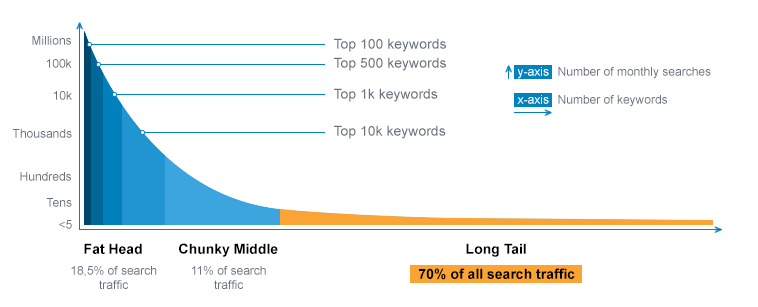Our guest author today is William Weil from Webburgh, Inc. Summary: Voice search technology has revolutionized the way people use the Internet. These days, many users would rather speak into the phone with their search query instead of typing it out. That’s why it’s no longer enough to simply optimize your website for traditional online search – you must now optimize it for voice search as well. In this article, we share five ways by which you can increase your voice search traffic.

Written by William Weil
William Weil runs Webburgh, Inc. and has been doing marketing and software development for 38 years.
At least one-fifth of mobile queries are voice searches – a large number of people today use virtual assistants like Google Assistant, Siri, and Cortana to search for not only information, but also businesses.
What is voice search and why is it so important for your business?
In case of voice search, you speak into the phone to a virtual assistant, such as Siri or Cortana.
The virtual assistant transcribes your speech into text and scans it for questions and commands.
Next, the virtual assistant searches for relevant information in search engines and translates the information back to the user.
This is done either by speaking to the user or by presenting a relevant web page.
People of all age groups use mobile assistants – on the go, with friends, and even in the bathroom!
So, if you want to cater to the rising need of smartphone users, you will have to optimize your website for voice search.
This way, you can increase the chances of your content appearing in the direct answer or rich answer box, as well as the possibility of gaining new customers.
What are some of the ways to optimize your site for voice search?
Luckily, optimizing your site for voice search doesn’t have to be complicated – it’s cost-effective and easy if you follow the suggestions below.

- Optimize for local search
Whenever virtual assistants want to find details about local businesses, they turn to Google My Business and other directory listings.
This gives them important information, such as the name, address, and phone number of the business, along with business hours, website, and more – so you must ensure that your business is listed here with all these details.
Additionally, you can include an introduction to your business and describe your products in short and easy to understand sentences.
Make sure you also select the most relevant categories under which your business fits.
This will increase your chances of showing up in relevant voice queries and improve business rankings, too!
Remember that not all virtual assistants use the same search engine – so you want to also list your business on other directories, like Bing Places, Yelp, YellowPages, Apple Maps, Foursquare, Dun & Bradstreet, and so on.
Always post your location, hours, and phone number on your website.
You can also include location-related keywords in your website content and back-end coding.

- Ensure your website is mobile-friendly
Most verbal questions are asked on mobile, so you need to optimize your site for mobile use if you want to show up in search results for voice queries.
You must specifically incorporate features that are useful for voice search capabilities, for example, AMP pages that help a site load quickly.
This is because when a user asks their virtual assistant a question, they usually get an answer back within a second, but the average web page loads in about 2 seconds.
As far as AMP pages are concerned, they load almost instantly by restricting HTML, CSS, and JavaScript.
AMP pages are also automatically cached by Google – in other words, they are temporarily stored so that they do not need to be loaded every time.
When your website loads speedily, you can beat the competition.
Also, pay attention to the design of the website – while reading from a smartphone, users keep their eyes focused on one place and scroll and swipe the page with their fingers.
If there are elements that are too small to read without pinching and pulling, or buttons that are too small to press easily, Google, for one, will penalize the prioritization of your site in search results.
Lastly, to make it easier for the user to skim through your website while using a mobile device, include short sentences, appealing headings, and simple words.

- Target long-tail keywords and use conversational language
Voice searches tend to be longer and more conversational than searches on a keyboard.
For example, if you want to make a chocolate cake at home, you might type “chocolate cake recipe” in the search box.
But as far a voice search is concerned, you are more likely to ask longer questions like “How do I make chocolate cake from scratch?”
If your website has closer matches to these longer phrases, it’s more likely to be chosen as a result by the voice search engine.
Thus, it is important to target long-tail keyword phrases and use conversational language while optimizing for voice search.
The idea is to imitate the way people talk and ask questions.
Figure out the type of question keywords used by people, along with their conversational style.
Understand the questions that are being asked the most along with the most appropriate answers to these questions.
Then, create content pages that focus on long-tail keywords and conversational/informal language to effectively optimize your site for mobile search.
- Add FAQs to your website
An average voice search answer is about 29 words long – so it can be helpful to have FAQ responses on your website answer queries in less than 30 words.
As you wouldn’t want to create a 30-word blog – it makes more sense to make a FAQ page instead.
What’s more –the FAQ format makes it easy for Google to pull content from your website and display it as a rich snippet.
This in turn improves page rankings.
And how do you identify the questions that you should answer?
Well, one way is to use Google’s autocomplete suggestions – it gives you the most commonly asked questions related to the criteria that you type out.
A second option is to type out keywords on sites like Quora – the search results will show the most commonly asked questions related to these criteria, along with the answers.
Finally, you could just put yourself in the shoes of your target audience – think about the questions that your customers ask of you, or that you feel that they might have.
Then, put up the same (along with the answers) on your FAQ page.
- Incorporate structured data
Statistically, 36.4% of voice search results came from pages that use schema markup structured data.
So, if you want search engines to understand the content of your site more clearly, you must incorporate structured data into your website pages.

In particular, Speakable markup is very useful because it was designed specifically for voice search answers.
It lets you identify parts of your content that are written for audio playback, like text-to-speech (TTS).
This markup allows Google to quickly recognize content to play back to the user that will sound natural.
In other words, it’s another one of the effective ways in which you can optimize for voice search.
Voice search is fast becoming the preferred way through which consumers search for information and local businesses.
Why not take advantage?
